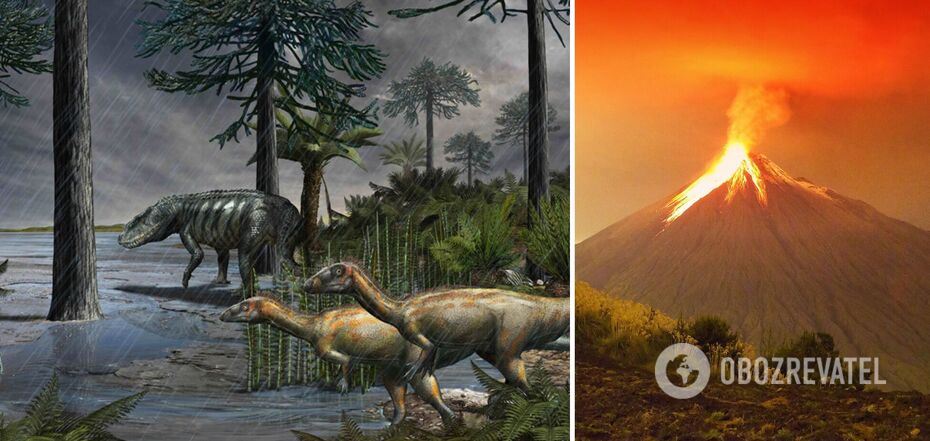Life
Rain that lasted for almost 2 million years helped dinosaurs take over the Earth: what scientists know about it
Dinosaurs became the dominant species on Earth not because of their massive size, but because of the rainy season, which left no chance of survival for smaller species of animal life. According to scientists, the incredible downpour on Earth began about 232 million years ago.
According to IFLScience, the rain discovery was made by geologists back in the 1970s and 1980s, when they noticed unusual layers deposited in ancient rocks. Scientists estimate that these layers date back to about 232-234 million years ago.
Subsequently, scientists compared the data and realised that this rainy period was the beginning of the dinosaur era, when their number and diversity were rapidly increasing. Scientists had more and more evidence that this wet period could have been "the trigger that allowed dinosaurs and possibly other land animals to diversify and dominate the land".
Over time, signs of this period, called the Carnian Pluvial Episode, or the Carnian Crisis, have been found in rocks around the world. Scientists suggest that the unusual amount of precipitation was caused by a massive increase in humidity, which was probably due to a giant volcanic eruption.
"The peak of the eruptions was during the Carnian period. A few years ago, I studied the geochemical signatures of the eruptions and found some massive impacts on the atmosphere around the world. The eruptions were so powerful that they released huge amounts of greenhouse gases such as carbon dioxide, leading to spikes in global warming," said Dr Jacopo Dal Corso of the Chinese University of Geological Sciences.
Paleoenvironmental researcher Paul Wignall also explained that the supercontinent Pangaea, which existed on Earth at the time, was prone to monsoons, which occur when moisture-laden air from the seas blows onto land. This led to the fact that such humid air cooled and fell in the form of heavy rains. As the seas became very hot during this period, more moisture accumulated over them, causing even more monsoons and heavier rains on land.
According to scientists, this wet period was not very favourable for living organisms.
"Volcanic eruptions generated acid rain and greenhouse gases, which in turn led to extinctions due to shock warming, depletion of vegetation and soil on land, and anoxia and ocean acidification," the article in the Journal of the Geological Society says.
Many species were wiped out during this period, but dinosaurs emerged victorious.
"Following the mass extinction of plants and major herbivores on land, dinosaurs were the main beneficiaries of the recovery, rapidly increasing in diversity, ecological impact, and regional distribution, first from South America and then to all continents," the scientists said in their paper.
They suggest that this prolonged rainy period may have been one of the most important in history in terms of sustaining the dinosaur era and the origin of most of the key organisms that have shaped the modern fauna of land animals: amphibians, turtles, crocodiles, lizards and mammals.
Previously OBOZREVATEL told about the unusual discovery of a nest with the remains of incubating dinosaur eggs.
Subscribe to OBOZREVATEL's Telegram and Viber channels to keep up with the latest news.



























